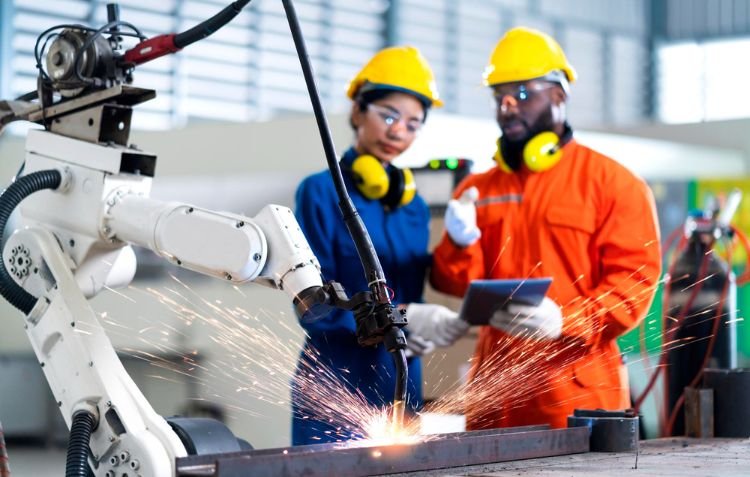Revealing What Drives the Success of Manufacturing in Georgia.
Georgia has earned a reputation as a manufacturing powerhouse in the United States, thanks to its robust industrial infrastructure and business-friendly environment. Home to a diverse range of industries, the state consistently ranks as one of the best places for manufacturing, bolstered by its strategic location and skilled workforce. Recent developments, such as Hyundai’s groundbreaking $7.6 billion electric vehicle plant in Bryan County, highlight Georgia’s commitment to innovation and economic growth. This massive investment, expected to produce 300,000 electric SUVs annually and create thousands of jobs, underscores the state’s role in shaping the future of American manufacturing.
But what drives the success of manufacturing in Georgia? This article delves into the key factors contributing to the state’s manufacturing success, including its strategic advantages, skilled labor, innovative practices, and supportive policies. Join us as we uncover the elements driving Georgia’s industrial excellence.
Georgia’s Manufacturing Landscape
Georgia’s manufacturing sector is a cornerstone of its economy, combining deep historical roots with a modern, innovative approach. This section explores the state’s journey from its industrial beginnings to its current achievements as a leading manufacturing hub.
Historical Context
Tracing Georgia’s Industrial Roots
Georgia’s industrial journey began in the early 19th century, earning it the nickname “The Empire State of the South.” Its antebellum industrialization was driven by textile mills and railroads, which played a vital role in shaping the state’s economy and infrastructure. This early embrace of industry laid the groundwork for its manufacturing success.
Evolution over the Years
Post-Civil War, Georgia diversified its industries, moving beyond agriculture to include machinery, chemical production, and consumer goods. These developments helped the state transition into a modern industrial economy, setting the stage for the advanced manufacturing operations seen today.
Current Manufacturing Statistics
An Economic Powerhouse
According to the Georgia Manufacturing Data Dashboard (GAMEP), the state boasts over 10,000 manufacturing facilities, employing more than 400,000 workers. These facilities contribute approximately $62 billion annually to Georgia’s GDP, making manufacturing one of its top economic drivers.
Sector Highlights
Georgia leads in industries like aerospace, automotive, and food processing. The state’s strategic location with access to ports, railways, and highways enhances its supply chain efficiency, solidifying its status as a manufacturing powerhouse.
Factors Contributing to Success of Manufacturing in Georgia
Georgia’s manufacturing success is driven by a combination of strategic advantages that create a thriving ecosystem for industries. From its prime location to a skilled workforce and cutting-edge innovations, these factors collectively fuel growth and competitiveness.
Strategic Location and Infrastructure
A Gateway to Global Markets
Georgia’s position in the Southeastern U.S. offers unparalleled access to domestic and international markets. The Port of Savannah, one of the largest and fastest-growing ports in the nation, handles millions of containers annually, enabling manufacturers to reach global customers efficiently. Additionally, the Hartsfield-Jackson Atlanta International Airport provides rapid cargo transit, enhancing global trade capabilities.
Comprehensive Connectivity
The state’s extensive highway network, including major interstates like I-75 and I-85, and a robust rail system managed by companies like CSX and Norfolk Southern, streamline transportation. These infrastructure assets reduce shipping costs and ensure swift delivery, giving manufacturers a competitive edge.
Skilled Workforce and Education

Tailored Workforce Development
Georgia supports its manufacturing sector through a highly skilled labor force. Institutions like Georgia Tech and the Technical College System of Georgia (TCSG) offer specialized programs in engineering, robotics, and advanced manufacturing. Workforce development initiatives such as Quick Start provide free, customized training to meet employers’ needs.
Commitment to Talent Growth
With a focus on STEM education and apprenticeship opportunities, Georgia ensures a steady pipeline of skilled workers. The state’s proactive approach to workforce readiness strengthens its appeal to manufacturers seeking talent aligned with modern industry demands.
Business-Friendly Environment
Low Costs and Incentives
Georgia is known for its low cost of doing business, featuring competitive utility rates and minimal regulatory hurdles. The state offers attractive tax credits, such as job tax credits and investment credits, to manufacturers, making it financially advantageous to operate here.
Supportive Government Policies
Initiatives like the Georgia Business Expansion and Support Act provide resources and funding to encourage manufacturing growth. Combined with its AAA credit rating, Georgia’s stable economy fosters a secure environment for long-term investments.
Innovation and Technology Adoption
Leading in Advanced Manufacturing
Georgia manufacturers are at the forefront of adopting technologies like automation, Artificial Intelligence, and IoT to boost productivity. According to the Georgia Manufacturing Survey, 70% of manufacturers in the state have implemented advanced technologies to improve operations and reduce costs.
Encouraging Innovation
With innovation hubs like the Advanced Technology Development Center (ATDC) and partnerships between industry and academia, Georgia promotes a culture of innovation. Manufacturers leverage these resources to remain competitive in global markets.
Case Studies of Manufacturing Success in Georgia
Georgia’s manufacturing sector is defined by stories of innovation and growth. This section highlights real-world examples of companies thriving in the state due to its business-friendly environment and strategic advantages.
Hyundai Motor Group Metaplant America
Revolutionizing EV Manufacturing
Hyundai Motor Group’s $7.6 billion investment in Bryan County has positioned Georgia as a hub for electric vehicle (EV) manufacturing. The Hyundai Metaplant America facility, announced in 2022, represents the company’s commitment to advancing green technology. Projected to produce 300,000 EVs annually, this plant marks a significant step in the global shift toward sustainable mobility.
Economic and Job Growth
In addition to boosting Georgia’s manufacturing output, the project is expected to create 8,500 jobs, ranging from engineering to assembly line positions. The plant’s location near the Port of Savannah ensures efficient supply chain logistics, enabling Hyundai to reach global markets seamlessly. This landmark investment underscores Georgia’s appeal to major international manufacturers.
Georgia-Pacific’s Technological Advancements

Harnessing the Power of Technology
Atlanta-based Georgia-Pacific, a leading manufacturer of paper and building products, has embraced cutting-edge technologies to streamline operations. By leveraging advanced analytics and Amazon Web Services (AWS), the company has optimized production processes, reduced waste, and significantly increased productivity.
Transformative Results
Through predictive analytics, Georgia-Pacific identifies potential equipment failures before they occur, minimizing downtime and enhancing operational efficiency. Their use of cloud-based solutions enables real-time monitoring of production lines, resulting in higher profitability. Georgia-Pacific’s success demonstrates how Georgia-based manufacturers are capitalizing on technology to remain competitive in a rapidly evolving market.
Challenges and Future Outlook
While Georgia’s manufacturing sector thrives, it faces challenges that could shape its future trajectory. Addressing workforce gaps and sustainability issues will be critical for maintaining long-term growth.
Addressing Workforce Shortages
Challenges in Talent Availability
A major hurdle for Georgia’s manufacturing sector is the shortage of skilled workers. As industries expand, the demand for specialized roles in robotics, automation, and engineering continues to outpace supply. This talent gap risks slowing production and hindering growth.
Workforce Development Initiatives
To address these challenges, Georgia has introduced programs like the Georgia Quick Start initiative, which offers tailored training for manufacturers. Partnerships between companies and educational institutions, such as technical colleges, focus on equipping workers with relevant skills. Additionally, targeted efforts to attract younger talent into the sector aim to ensure a steady pipeline of skilled employees for the future.
Sustainability and Environmental Considerations
The Push for Sustainable Manufacturing
Sustainability is a growing focus for Georgia’s manufacturers as consumers and regulators demand eco-friendly practices. Companies are tasked with reducing their carbon footprint, minimizing waste, and conserving resources while maintaining productivity.
Adapting to Environmental Concerns
Many manufacturers are embracing renewable energy sources, energy-efficient processes, and sustainable materials. For example, Georgia Power’s renewable energy programs offer incentives for businesses adopting greener operations. By aligning with environmental goals, Georgia’s industries position themselves as leaders in responsible manufacturing while meeting global sustainability standards.
Conclusion
Georgia’s manufacturing success is built on a foundation of strategic advantages and proactive initiatives. Its prime location, bolstered by world-class infrastructure like the Port of Savannah and extensive rail networks, ensures efficient distribution for global markets. A skilled workforce, supported by innovative educational programs and partnerships, addresses industry needs while fostering talent development.
Business-friendly policies, including favorable tax structures and government incentives, create an environment where manufacturers can thrive. Furthermore, the adoption of advanced technologies and a commitment to sustainability showcase Georgia’s forward-thinking approach, positioning the state as a leader in modern manufacturing.
With ongoing investments and initiatives to address workforce challenges and sustainability concerns, Georgia’s manufacturing sector is set to grow even stronger. By continuing to leverage its strengths and adapt to future demands, Georgia ensures a prosperous future for manufacturers, workers, and the state’s economy alike.
FAQs
What is Georgia famous for manufacturing?
Georgia is renowned for manufacturing in sectors such as aerospace, automotive, and food processing, with companies like Lockheed-Martin, Kia, and numerous food processors contributing significantly to the state’s economy.
How does the manufacturing industry help Georgia’s economy?
The manufacturing industry bolsters Georgia’s economy by accounting for 9.35% of the state’s total output, contributing $64.94 billion in 2021, and employing approximately 402,000 workers.
Why Georgia is best for business?
Georgia’s pro-business environment is characterized by a skilled workforce, reliable infrastructure, low taxes, and high state credit ratings, making it an attractive location for companies.
What makes Georgia ideal for companies to produce their goods?
Georgia’s strategic location, with access to global markets through its ports and transportation networks, combined with a low cost of doing business and experienced workforce, makes it ideal for companies to produce their goods.
What is the fastest growing industry in Georgia?
The food processing industry is among the fastest-growing sectors in Georgia, with significant economic development projects announced in recent years.







